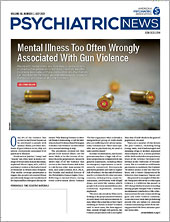The article by Ryan F. Savino, L.M.S.W., M.B.A., and Ezra Susser, M.D., Dr.P.H., in the April
Psychiatric News describes the emergency use of empty hotel space to house homeless persons during the pandemic. Discussing New York City, they write, “Officially, the city regards hotels as temporary accommodations” and go on to express their hope, based on federal funding and in the absence of statements by New York City mayoral candidates to the contrary, that the current situation will become permanent. They view the issue exclusively through their concern for the homeless without regard for the impact on the community, which has seen a deleterious impact on its street life.
Reflex accusations of NIMBYism were quickly leveled against those who expressed opposition. However, those allegations seemed questionable given the reality that Manhattan’s Upper West Side is a liberal bastion that prior to the pandemic was the site of a disproportionate amount of housing for homeless people, those with disabilities both mental and physical, residences for single mothers, and so on.
A significant difference was that earlier residences were created with community consultation and collaboration. The authors neglected to reveal that no advance notice was provided to the community or its elected representatives prior to hundreds of homeless people being parachuted into a very circumscribed residential neighborhood. On a community board–sponsored Zoom, representatives of the New York City Department of Homeless Services (DHS) were disingenuous when asked about the housing remaining temporary. Currently the ultimate resolution of the matter remains uncertain.
What is clear is that the DHS’s claiming one course while concealing its effort to achieve another fosters considerable, justified mistrust of local government even among those who believe government can be a constructive force. When I was chair of the New York State Mental Health Services Council, I encountered too many civil servants who seemed to believe that statutes and regulations represented a floor, not a ceiling, to the policies they backed. I found their attempts to overreach off-putting, as I do my city’s recent actions.
Accomplishing even worthy ends using bait-and-switch means is a dubious proposition. Solving important domestic problems requires an effort to create alignment of the government and the governed. ■
BARRY B. PERLMAN, M.D.
New York, N.Y.
Response by Ryan F. Savino, L.M.S.W., M.B.A., and Ezra Susser, M.D., Dr.P.H.
We appreciate the opportunity to address points raised by Dr. Perlman. He is by no means alone in his reservations, although they are not shared by all in the Upper West Side. Nonetheless, we agree that, while it saved lives, the process of implementing the move to hotels was flawed, and we share some of his concerns in this regard. Hastily devised policies directed toward health care professionals, business owners, workers, and, yes, people experiencing homelessness have abounded during this unprecedented public health crisis.
What we propose is a nationwide program building upon, rather than reversing, what has already been done. We contend, first, that it would be inhumane to now evict the thousands of formerly homeless people who have been provided with good accommodations; second, that there is no longer grounds for complacency based on the perception that accommodating homeless people is an “intractable problem”; third, that such accommodations should be but one element in a broader initiative to create housing for people who are homeless; and fourth, that the burden and benefits of new policies should be fairly distributed across neighborhoods, requiring consultation with community groups and with homeless people themselves.
Finally, we underscore that the thousands of people moved into hotels are but a fraction of the tens of thousands of New Yorkers experiencing homelessness. At its current pace of construction, “affordable housing” is neither plentiful nor affordable enough for these citizens. To delay good accommodation in the meantime is to prolong homelessness. We believe that is inhumane and unjustified.
JOE SIMPSON, M.D., PH.D.
Los Angeles, Calif.
